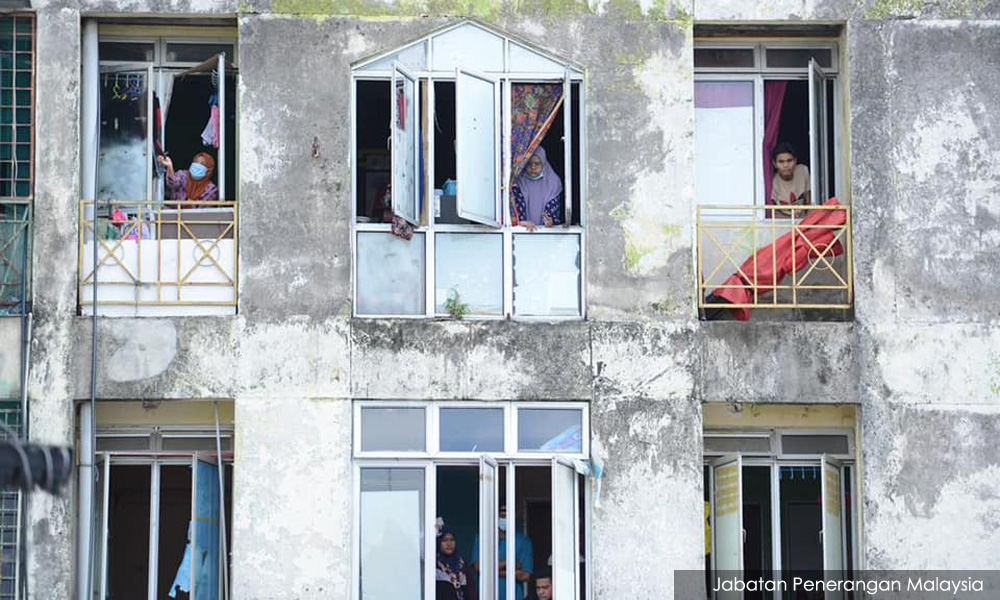Today marks the anniversary when a lockdown was first introduced in Malaysia and when the Covid-19 virus reality hit home – as literally Malaysians were forced to stay at home.
Over the last year, there have been 328,466 confirmed cases and 1,223 deaths recorded. By comparison to other parts of the world, Malaysia has the third highest cases of Covid-19 in Southeast Asia and ranks 36 globally in the total recorded cases.
Her recovery rate from Covid-19 has been impressive and only four out of 100,000 people have been affected by the disease. Most of the cases have come in the third wave of the virus, after the super spreader Sabah elections. From Sept 13, 2020, to today, there have been 318,552 Covid-19 cases and 1,095 deaths. The third wave is not over.
Personal scars
While more Malaysians die of other diseases annually (heart disease, strokes, cancer and diabetes, for example), Covid-19 deaths have been serious. They have come suddenly and hit families hard.
There remains inadequate support for those who have lost loved ones, almost no recognition for those who have symptoms after the virus infection (long Covid-19) and continued stigma for those who survived Covid-19, some of whom remain traumatised from the experience. More can be done to offer support to those affected personally by the pandemic.
Frontliners have rightly been lauded. They have saved so many lives affected by Covid-19 over the past year at risk to their own. Despite their priceless contributions, they remain undervalued, with many on short term contracts, inadequate appreciation of the psychological and physical impact of working long continuous days, and for comparatively low salaries, especially when compared to those for similar work globally.
As the pandemic has progressed, strain and stress have compounded in the face of risk, with inadequate relief or reward.
For most Malaysians, the impact has been felt through the lockdown. Malaysia – at least parts of her – has been in some sort of lockdown for eight of the last 12 months, with the months of June through September masked but more open.
In the other months, there have been various degrees of confinement with various acronyms and steady flows of changing regulations. It has been difficult to keep up, with most tuning out.

The government has responded with tougher enforcement. This trend has been towards higher punishments for ordinary citizens with less confidence in the measures imposed. The anguish people are expressing over the exorbitant fines compounds the anxiety in a year where orders have been delivered without adequate public engagement or education.
Lockdown has had other social effects. For over half the year many Malaysians have not been able to engage in interdistrict/interstate travel, to see loved ones, including those who have not been well.
For those visiting Borneo the obstacles of travel have included quarantine requirements that have further prevented many from seeing loved ones even when the situation opened up.
For those who have family abroad, the obstacles have been even higher. Separation has been hard. Virtual communication has helped, but it cannot compensate for the lack of physical contact.
The isolation has contributed to the sharp rise of suicides. The Health Ministry recorded 465 suicide attempts between January and July 2020. A total of 266 committed suicide from March 18 to October 31 last year, an average of an estimated 30 suicides per month, or an estimated one a day during the lockdown last year.
The actual numbers are higher; suicides are often not reported. No change has been made to decriminalise suicide attempts, to help contribute to conditions that make it easier for Malaysians to seek help.
Lockdown conditions have also placed those vulnerable at home at greater risk. Official figures put the reported cases of domestic violence against women at 1,930 through August last year during the lockdown. According to Bukit Aman, there were increases in parental abuse by adult children as well.
The figures for elderly and child abuse are not available. While civil society and some government agencies have offered support, more can be done to ameliorate risks for those at risk.
Economic hardship
For the majority of Malaysians, the most impactful change has been in the economy. While saving lives, lockdowns have hurt the economy. It is not known how many businesses have closed, but everyone knows of a few – a restaurant, a hotel, a photo or bookshop. The closed grills on buildings reflect locked hopes and dreams.
Malaysia has the highest number of unemployment in history, as unprecedented numbers of companies and businesses have had to make job cuts. We see unemployment numbers reaching a record 782,500 in January this year at a rate of 4.9 percent, according to the Department of Statistics.
These are disproportionately young people. The sectors most hurt involve tourism and retail. The struggles people are facing finding jobs are real.

The burden of lockdown is not the same for all Malaysians. Those with children, especially mothers, have had to take on triple-work – caring for the household, caring for the children and holding down a job.
Malaysia already has a comparatively low female participation rate of 55.6 percent (2019) in the workforce. Lockdown has inevitably led to more women leaving the workforce. This has contributed to less money coming into households.
We do not yet know the full effect of the economic contraction, as it is also not over.
Taking stock
For many privileged people, the lockdown has been an opportunity to take stock, to reorient the pace of life and its priorities. No question there have been positives – not least of which there has been less traffic and pollution – at least in the first lockdown period. For most, however, this year has not been an easy one on many levels.
The vaccines offer hope, but at a pace of less than 1.2 percent of the population vaccinated so far – this solution lies far, far ahead. More attention will be needed for the other problems lockdown has accentuated and caused, which have yet to be fully incorporated into reported plans or assessments.
As we enter the second year of lockdown, there needs to be more stock-taking of the lockdown and its effects, to recognise that solutions have consequences and these consequences need to be understood and addressed.
BRIDGET WELSH is a senior research associate at the Hu Fu Centre for East Asia Democratic Studies and a senior associate fellow of The Habibie Centre. She currently is an honorary research associate of the University of Nottingham, Malaysia's Asia Research Institute (Unari) based in Kuala Lumpur. She tweets at @dririshsea. - Mkini
The views expressed here are those of the author/contributor and do not necessarily represent the views of MMKtT.




No comments:
Post a Comment
Note: Only a member of this blog may post a comment.